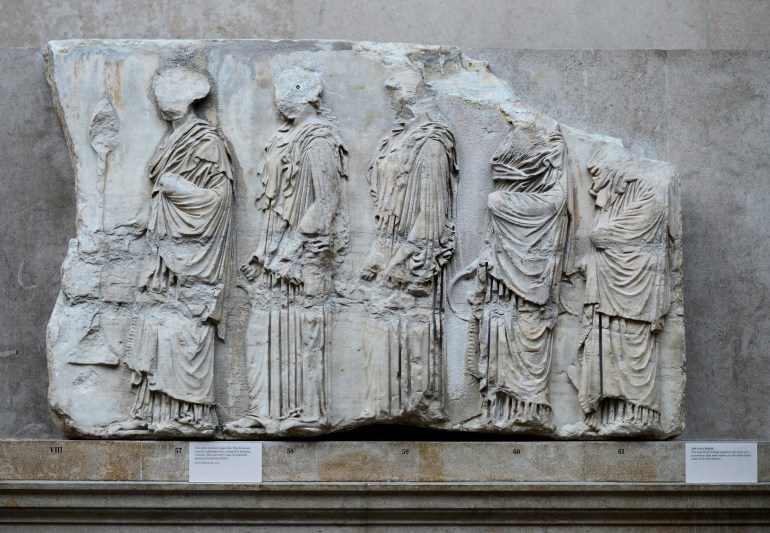British Museum director resigns, admits to failings in theft investigation
Museum’s director Hartwig Fischer says that he did not take warning of theft from museum collection seriously enough.

The director of the British Museum said he would resign after admitting to failings in his investigation of the theft of items from the museum’s collection.
The museum was alerted more than two years ago to the possible theft or disappearance of valuable artefacts when an art historian became suspicious about objects for sale online.
Keep reading
list of 4 itemsWill the Parthenon marbles ever return to Greece?
Greece seeks return of Parthenon Marbles amid restoration project
Xi backs Greek case for return of Parthenon Marbles from UK
But the museum’s director, Hartwig Fischer, said that he did not take the warning seriously enough and announced his resignation on Friday as investigators figure out what happened to hundreds of missing items, including gold jewellery, semi-precious gems and antiquities dating to the 15th century BC.
Fischer, a German art historian who had led the museum since 2016, said that there could have been a better response to the warnings that an employee may have been stealing items and the failings “must ultimately” rest with him.
“It is evident that the British Museum did not respond as comprehensively as it should have,” he said in a statement.
“The responsibility for that failure must ultimately rest with the director.”
The museum, one of London’s most popular tourist attractions, said last week a member of staff had been dismissed after items including gold jewellery and gems dating from the 15th century BC to the 19th century AD, had been found stolen from a storeroom.
Police said on Thursday they had interviewed but not charged an unnamed man over the stolen artefacts.
The British Museum initially said in the statement that Fischer would step down “with immediate effect”, but later removed those words and said he would resign once an interim leader had been found.
Fischer said that he withdrew remarks made about the art dealer who first alerted the museum’s authorities to the stolen items. He claimed earlier this week that Ittai Gradel, an antiquities dealer, withheld information about the scale of the stolen items when he contacted the museum.
Fischer expressed “sincere regret” over the “misjudged” comments.
Gradel said that Fischer had done the right thing by stepping down, and he accepted his apology. But he said the deputy director, Jonathan Williams, should also resign, adding that Williams had assured him that a thorough investigation found no improprieties.
The museum said on Friday that Williams would step aside during the independent review.
“He basically told me to sod off and mind my own business,” Gradel said. “It is beyond me how any responsible museum person could see this evidence without all alarm bells going off immediately.”
The museum’s board of trustees, chaired by former Finance Minister George Osborne, accepted Fischer’s resignation.
“We are going to fix what has gone wrong,” Osborne said.
“The museum has a mission that lasts across generations. We will learn, restore confidence and deserve to be admired once again,” he said.
The museum has also attracted controversy because it has resisted calls from communities around the world to return items of historical significance that were acquired or stolen during the era of the British Empire and Britain’s colonial rule.
The most infamous of these disputes include marble carvings from the Parthenon in Greece and the Benin bronzes from West Africa.
“We want to tell the British Museum that they cannot any more say that Greek [cultural] heritage is more protected in the British Museum,” Despina Koutsoumba, head of the Association of Greek Archaeologists, told the BBC this week.
Al Jazeera’s Sonia Gallego, reporting from London, said the resignation tops a week of turmoil for the museum and highlighted the longstanding controversy of the museum’s continued claim over the Parthenon sculptures, otherwise known as the Elgin Marbles.
“Greece’s minister of culture has said that the whole argument for them being housed at the British Museum – for security, for safekeeping – really now has to be questioned,” Gallego said.
Greece wants the sculptures returned to “their country of origin as soon as possible”, she added.
